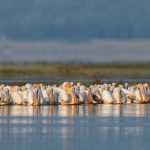Agro World News: IUCN World Conservation Congress signals global consensus on protection of seamounts
The 2025 International Union for Conservation of Nature (IUCN) World Conservation Congress (WCC) marks a milestone moment today with the adoption of a resolution transition from destructive fishing practices on seamounts in international waters by the end of 2026.
The Deep Sea Conservation Coalition (DSCC), together with lead proposer WWF Australia, and co-proposers Marine Conservation Institute, Blue Marine Foundation, Natural Resources Defense Council (NRDC), Canadian Parks and Wilderness Society, Environment and Conservation Organisations of New Zealand, and Australian Foundation for Wilderness, took Motion 032 to the Congress – calling for a transition away from bottom trawling on seamounts by the end of 2026.
Today, the Motion was adopted with an overwhelming majority, reflecting broad global consensus. The Motion received a yes vote from 95% of States and government agency members, and 99% of NGOs and Indigenous People’s organizations.
Bronwen Golder, Global Seamounts Campaign Director at the DSCC, said: “The adoption of Motion 032 represents a tangible step towards ocean protection at a global scale. With the recently-ratified High Seas Treaty, 2030 fast approaching with the goal to protect at least 30% of our ocean, and next year’s UN Bottom Fisheries Review, it is a critical time to be putting the protection of all seamounts at the heart of global ocean conservation.”
Seamounts are biodiversity hotspots and vital feeding grounds that sustain ocean life, from deep-sea corals and sponges to migratory species like whales, sharks, and turtles. For decades, seamounts have been targeted by industrial, destructive fishing activities such as bottom trawling. Trawling not only catches target species of fish, but many threatened species alongside them, and destroys ancient, fragile ecosystems such as coldwater coral and sponge ecosystems, which may never recover from the damage.
Motion 032 is based on scientific evidence accumulated over the past two decades that show seamounts and the species and ecosystems they support to be unique, structurally complex, and fragile. Numerous studies have consistently demonstrated that bottom trawling on seamounts causes widespread, irreversible degradation of deep-sea ecosystems. In 2021, the United Nation’s Second World Ocean Assessment concluded that “Fishing, especially bottom trawling, constitutes the greatest current threat to seamount ecosystems.”
In calling for the phase out of bottom trawl fishing on seamounts by the end of 2026, the adoption of the Motion sets the stage for a review, by the UN General Assembly next year, of whether high seas fishing nations and regional fisheries management organizations (RFMOs) have acted on 20 years of UN resolutions calling for urgent protection of seamounts and other areas of vulnerable deep-sea ecosystems and biodiversity from the impacts of high seas bottom trawling.
The adoption of Motion 032 today will bolster international efforts to halt the destruction of deep-sea biodiversity on the high seas which, in turn, will contribute to the success of global targets to halt and reverse biodiversity loss and strengthen the climate resilience of the deep sea.
Kate Noble, Senior Manager Oceans Policy at WWF Australia, said: “WWF is proud to have brought this motion to the IUCN. The world is waking up to the vital importance of seamounts, for so long hidden in the depths of the ocean. Whales, corals, seabirds, turtles and fish rely on them for survival, and their protection from destructive fishing is essential; we commend the IUCN members that championed the motion.”
Matthew Gianni, Co-Founder and Policy Advisor at the DSCC, said: “Motion 032 builds on nearly two decades of UN General Assembly (UNGA) resolutions and legal obligations that require States and RFMOs to prevent the impacts of bottom fishing on vulnerable marine ecosystems, including seamounts, and protect biodiversity in the marine environment. By adopting Motion 32, IUCN Members have reinforced the need to fully translate long-standing international commitments and legal obligations into concrete protection of the deep sea.”
Ακολουθήστε το Agrocapital.gr στο Google News και μάθετε πρώτοι τις ειδήσεις
Οι απόψεις που εκφράζονται στα σχόλια των άρθρων δεν απηχούν κατ’ ανάγκη τις απόψεις της ιστοσελίδας μας, το οποίο ως εκ τούτου δεν φέρει καμία ευθύνη. Για τα άρθρα που αναδημοσιεύονται εδώ με πηγή, ουδεμία ευθύνη εκ του νόμου φέρουμε καθώς απηχούν αποκλειστικά τις απόψεις των συντακτών τους και δεν δεσμεύουν καθ’ οιονδήποτε τρόπο την ιστοσελίδα.




